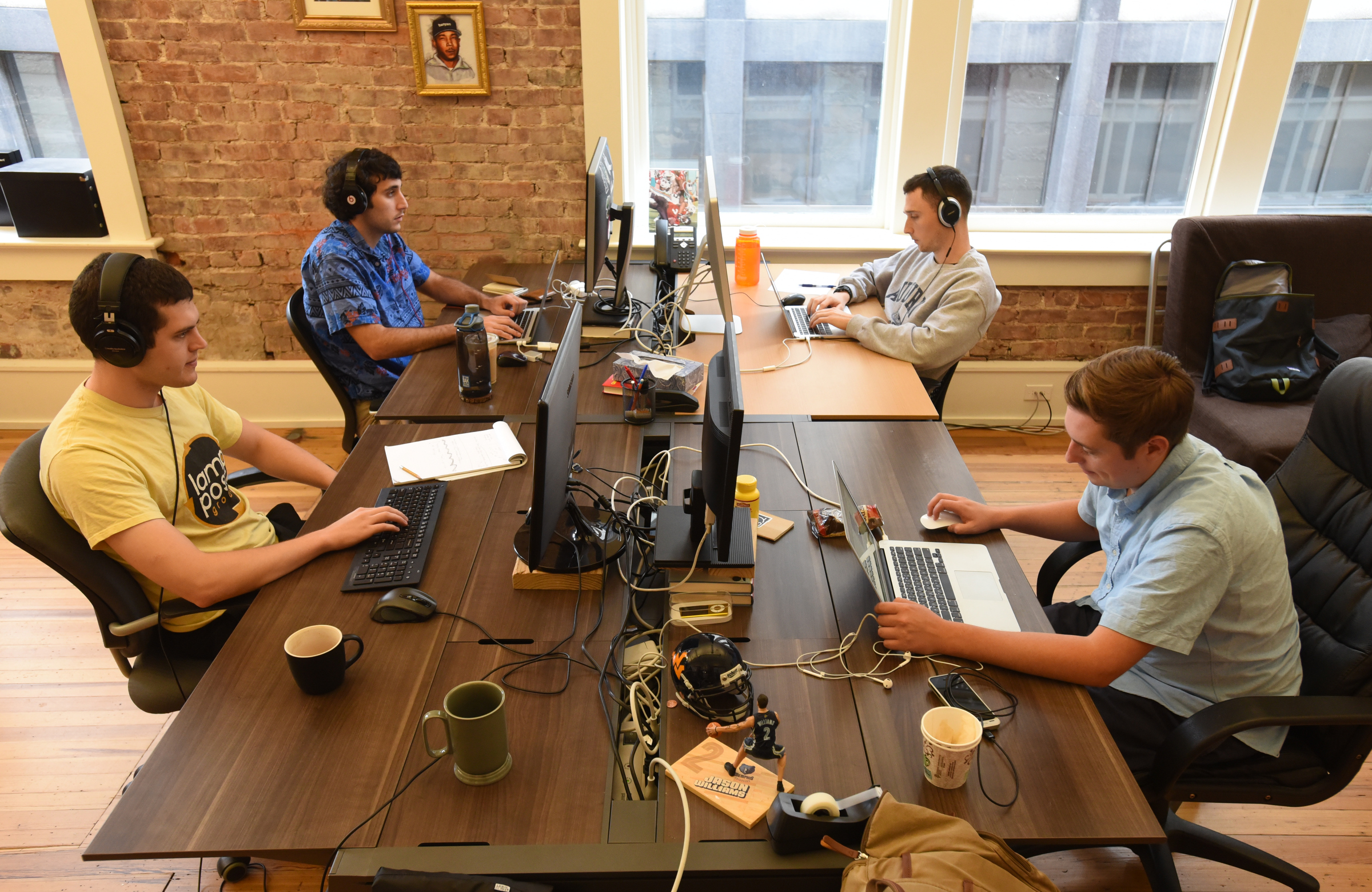Joda Thongnopnua is such a quick-draw on social media you can almost smell the smoke coming off his iPhone when he responds to a message. But despite his finely tuned technological reflexes, the 22-year-old is not a fan of an all-digital workplace.
The communications director for Lamp Post Group, a Market Street-based venture incubator, Thongnopnua says he prefers driving to the office over working from home, despite the group's flexible telecommuting policy.
"Before I entered the workforce, there was so much excitement about technology and the possibility that we would have this Utopian-style workplace that allowed us all to be at home in our pajamas working," he says. "But I think there's something so fundamental about going to work - getting dressed for work and then being in the office with people you work with - that gets me in the mental space to actually do my best.
"I think most offices should try to have some kind of flexible [telecommuting] policy but for me, I recognize that having the ability to have direct access to the people I work with makes things a lot easier."
Gen Z insights
A study by Robert Half and Enactus of Generation Z (those born between 1990 and 1999) found that they prefer face-to-face communication and working in an office instead of telecommuting. Here are some of the study’s other Gen Z revelations:* More than three-quarters (77 percent) expect to work harder than previous generations.* About a third (30 percent) would take a pay cut of 10-20 percent to work for a company with a mission about which they deeply care.* Their expected mean salary for their first post-college job is $46,799.* They expect to move around a lot, bouncing between four organizations throughout their career.* Most (82 percent) say their parents will help influence their career decisions.* Half of them say they would like to retire before age 60, but 54 percent expect to work until they’re 61-70.* Their top three job search priorities are “growth opportunities,” “generous pay” and “making a positive impact.”* The vast majority (79 percent) feel it will be easy to work with the members of Generation Y (born between 1977 and 1994), but about half (45 percent) believe it will “very or somewhat difficult” to collaborate with baby boomers (born between 1946 and 1964).Source: Robert Half, Enactus
Earlier this year, human resource consultant Robert Half and international nonprofit Enactus conducted a survey that analyzed the career goals and expectations of Generation Z, a group defined by researchers as those who were born in the 1990s. By 2020, this generation is expected to comprise about 20 percent of the American workforce but, despite being among the first wave of employees to be raised entirely in the smartphone era, the majority of respondents to the poll said they prefer old-school, face-to-face interactions to digital collaboration.
According to the study, nearly two-thirds (64 percent) of the 750 U.S. and Canadian students who were polled said they preferred working with a small group in an office to operating autonomously off-site (4 percent) or as part of a virtual team (3 percent).
A 2015 study by Pew Research found that 73 percent of teens have smartphones, and 58 percent cited texting as their preferred means of communicating with their closest friends. Once they're hired, however, Gen Z'ers fully expect to put their devices down. According to the Robert Half poll, about three-quarters (74 percent) of respondents said they prefer to communicate face-to-face rather than via instant messages or video chat.
"This generation has grown up with a lot of parental guidance," says Kevin Green, the Chattanooga-based division director for Robert Half Finance & Accounting. "They're used to getting that guidance in a face-to-face manner throughout their lives, so it's not surprising that they'll be looking for that in the work force, too."
And in person, he adds, they'll be able to present their ideas much more quickly and receive more detailed responses than is typically possible in a digital exchange.
"Every generation [of worker] wants feedback, but [Generation Z] will demand it," he says. "They want to be able to present solutions and have them considered right away. From a communication standpoint, that's why the face-to-face time will allow them to elaborate on and get deeper into explanation of their solutions."
Karen Culp, 36, is the creative director of local online designer and retailer Smart Furniture, whose Market Street office features door-less nooks that encourage the kind of collaboration that the Robert Half study says Gen Z workers will be looking for when they enter the workforce. The desire for an increasingly open environment that emphasizes comfort and team-building is reflected in the kinds of products Smart Furniture's clients are asking for, Culp says.
"We've had so much of an increase in the conversation about collaboration, which has led to furnishings that are a little more casual, like lounge-y tables you can use as a white board, and even little private cubbies," she says. "Cubicles are not where people are going anymore. It's about creating environments where people can be together."
Even though she now works predominantly from home and has cut back her hours to care for her two children, Culp says she longs for the creative energy and feedback of working alongside her colleagues.
The Robert Half study found that mentoring ability was the second-most-desirable trait Generation Z workers want in their managers - after honesty and integrity - and Culp says she can see how flesh-and-blood guidance would trump an online tutorial any day.
"We're all human," she says. "Those kids weren't raised by computers or phones or robots; they had parents hopefully.
"Google won't answer all your questions or teach you how to do everything. The best way to learn something is from someone who has experience and who can cater to your questions and specific needs."
Contact Casey Phillips at cphillips@timesfreepress.com or 423-757-6205. Follow him on Twitter at @PhillipsCTFP.

